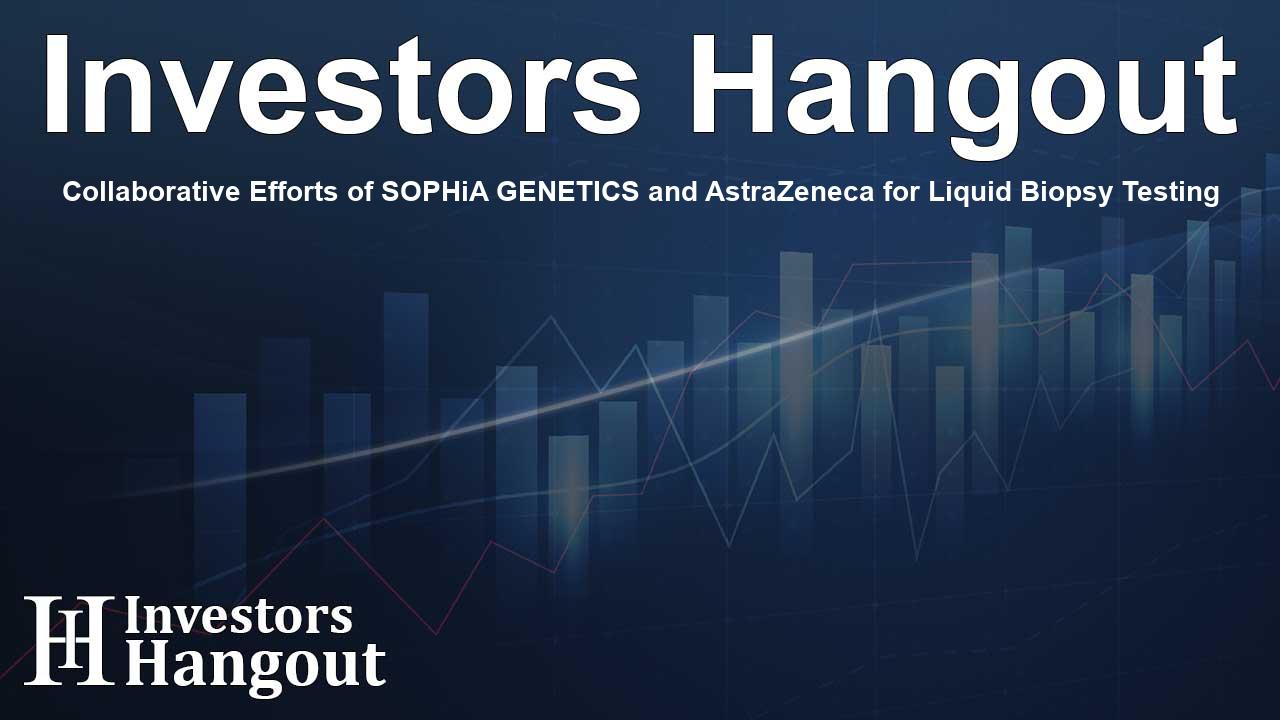Collaborative Efforts of SOPHiA GENETICS and AstraZeneca for Liquid Biopsy Testing

SOPHiA GENETICS and AstraZeneca Expand Access to Liquid Biopsy Testing
New tools are reshaping cancer diagnostics. SOPHiA GENETICS and AstraZeneca have teamed up to make liquid biopsy testing easier to access around the world. Their shared goal: bring this approach to 20 healthcare institutions within the next year, so more patients can benefit sooner.
Understanding Liquid Biopsy Testing
Liquid biopsy offers a less invasive alternative to traditional solid tumor testing. Instead of taking tissue, clinicians draw blood, extract cell-free DNA (cfDNA) from the plasma, and analyze it for circulating tumor DNA (ctDNA). The approach can simplify how clinicians monitor disease over time, which is easier on patients and more practical for busy care teams.
MSK-ACCESS® Powered with SOPHiA DDM™
At the center of this collaboration is MSK-ACCESS® powered with SOPHiA DDM™. Built in partnership with Memorial Sloan Kettering Cancer Center (MSK), this liquid biopsy solution brings advanced analytics together with a deep, cancer genomics knowledge base. The aim is straightforward: give healthcare providers a modern tool that supports earlier detection and clearer treatment pathways.
Built on Real-World Evidence
A comprehensive real-world evidence study anchors this effort. It will evaluate how liquid biopsy testing performs day to day—looking at the speed of reporting, the quality of results, and the operational fit across different laboratory settings. By documenting what works across varied environments, SOPHiA GENETICS and AstraZeneca intend to help bring liquid biopsy into routine clinical practice.
Why This Partnership Matters
The collaboration looks beyond technology alone to the broader question of access. Philippe Menu, M.D., Ph.D., at SOPHiA GENETICS, highlighted how this work could serve populations that are often overlooked, with the potential to improve both diagnostics and treatment decision-making worldwide. Just as important, the large body of real-world data generated through this initiative can inform future research and speed progress in care.
Wider Adoption and Future Potential
Since the introduction of the MSK-ACCESS powered with SOPHiA DDM™ solution, several leading healthcare institutions across the globe have committed to implementing the test. This early wave includes well-known cancer centers and reference laboratories, forming a growing network aligned around advancing cancer care.
International Reach
Participation spans the U.S., Canada, Brazil, Germany, Norway, France, the U.K., Taiwan, Nigeria, Italy, and India. Extending the testing footprint across these regions underscores a shared commitment to improving cancer diagnostics on an international scale.
Data-Driven Solutions for Patients
As more hospitals and laboratories adopt the test, they will generate large-scale datasets that show how liquid biopsy performs in real-world settings. Those insights help clinicians make informed choices, with the aim of improving outcomes for people living with cancer.
Next Steps and Ongoing Commitment
SOPHiA GENETICS will continue working closely with AstraZeneca and leading cancer institutes to expand the MSK-ACCESS® powered with SOPHiA DDM™ platform. The shared expectation is that better diagnostics can reach patients faster—and, with them, more timely treatment options.
Frequently Asked Questions
What’s the primary goal of the SOPHiA GENETICS–AstraZeneca collaboration?
To broaden access to liquid biopsy testing worldwide by bringing the approach to 20 healthcare institutions within the next year.
What is MSK-ACCESS® powered with SOPHiA DDM™?
It’s a liquid biopsy solution developed with Memorial Sloan Kettering Cancer Center that combines advanced analytics with cancer genomics expertise to support a less invasive alternative to traditional tissue biopsies and enable earlier, clearer care decisions.
How does liquid biopsy testing work?
Clinicians collect a blood sample, isolate cfDNA from the plasma, and analyze it to identify ctDNA. This method reduces the need for tissue biopsies and can simplify ongoing monitoring.
Why focus on real-world evidence?
Real-world evidence shows how the test performs across diverse labs—measuring speed, result quality, and operational fit—which helps guide broader, routine adoption.
How could this partnership affect cancer research and care?
By generating extensive real-world datasets, the initiative can inform clinical decisions, support more equitable access, and potentially accelerate research and treatment development.
About The Author
Contact Addison Perry privately here. Or send an email with ATTN: Addison Perry as the subject to contact@investorshangout.com.
About Investors Hangout
Investors Hangout is a leading online stock forum for financial discussion and learning, offering a wide range of free tools and resources. It draws in traders of all levels, who exchange market knowledge, investigate trading tactics, and keep an eye on industry developments in real time. Featuring financial articles, stock message boards, quotes, charts, company profiles, and live news updates. Through cooperative learning and a wealth of informational resources, it helps users from novices creating their first portfolios to experts honing their techniques. Join Investors Hangout today: https://investorshangout.com/
The content of this article is based on factual, publicly available information and does not represent legal, financial, or investment advice. Investors Hangout does not offer financial advice, and the author is not a licensed financial advisor. Consult a qualified advisor before making any financial or investment decisions based on this article. This article should not be considered advice to purchase, sell, or hold any securities or other investments. If any of the material provided here is inaccurate, please contact us for corrections.
